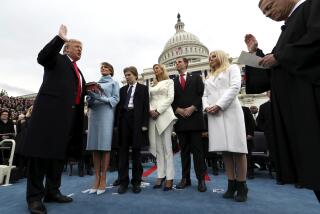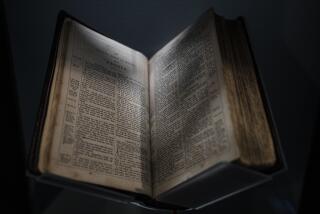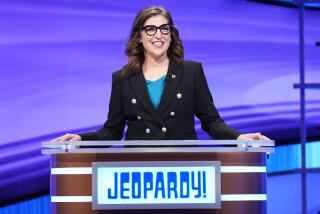Brush up your Bible and Koran
- Share via
“WHAT I do,” evangelist Joel Osteen told CNN’s Larry King in 2005, “is just try to teach practical principles. I may not bring the Scripture in until the end of my sermon, and I don’t feel bad about that.” Osteen wrote the bestselling “Your Best Life Now” and leads Lakewood Church in Houston, a nondenominational congregation of as many as 30,000 worshipers in an arena than once housed the NBA’s Houston Rockets. “I want to have a relationship with Jesus,” he explained.
Osteen’s sentiment summarizes the main argument in Stephen Prothero’s new book, “Religious Literacy”: Americans as a whole are more religious today than ever before, but they also are less versed in biblical Scripture, the Koran and other sacred texts of the world’s major religions.
For the record:
12:00 a.m. May 23, 2007 For The Record
Los Angeles Times Wednesday May 23, 2007 Home Edition Main News Part A Page 2 National Desk 1 inches; 52 words Type of Material: Correction
‘Religious Literacy’: In the March 28 Calendar, a review of the book “Religious Literacy: What Every American Needs to Know -- and Doesn’t” by Stephen Prothero said that Dwight Eisenhower was president in 1952 when he made a comment about the role of religion in government. Eisenhower didn’t become president until 1953.
The author of “American Jesus” cites the Gallup Poll, which found that Bible reading has declined since the 1980s and is now at a record low. Yet nearly two-thirds of Americans surveyed “believe that the Bible holds the answers to all or most of life’s questions, and a majority claims that it reads that book at least twice a month,” he writes. “If so, Americans are not reading particularly carefully.” Instead, many believe that “having a relationship with Jesus is more important than knowing what he actually did [and] believing in the Bible is more important than knowing what the Bible has to say.”
But after detailing his complaint, Prothero, chairman of Boston University’s religion department, solves the problem with a concise dictionary of key religious concepts. “My brief for religious literacy proceeds on secular grounds, on the theory that Americans are not equipped for citizenship without a basic understanding of Christianity and the world’s religions,” he asserts, adding, “What good can it possibly serve for citizens, religious or otherwise, to be ignorant of all this?” Prothero abstains from judgment on the assertions of evolutionary biologist Richard Dawkins, philosopher Daniel Dennett and neuroscientist Sam Harris, all of whom have penned polemics on the perils of religious fervor. For the most part, he also skirts the sex scandals that have involved the Catholic clergy and evangelists Ted Haggard, Jim Bakker and Jimmy Swaggart, or the anti-gay and anti-Islam positions of leading religious right figures such as Pat Robertson and Jerry Falwell. Nor does he consider whether Scientology is the next big thing in world religion or sci-fi quackery.
Instead, Prothero focuses on what he contends is a critical misconception about the constitutional separation between church and state, noting that the Supreme Court has repeatedly ruled that the 1st Amendment requires neutrality in teaching religion but not the muzzling of it. “That means not taking sides among the religions, not favoring Christianity over Buddhism, for example, or the Baptists over the Lutherans,” he writes. “But it also means not taking sides between religion and irreligion.” In other words, schools should not endorse or enforce religious views, but they should teach about different religions.
“We have had good reasons for our collective amnesia,” he explains. “More often than not it was tolerance -- first for other Protestants, then for Catholics, then for Jews, and more recently for Muslims, Buddhists and Hindus -- that drove us to jettison theology for morality.”
President Eisenhower summed up this uniquely American consensus in 1952, two years before the words “under God” were added to the Pledge of Allegiance: “Our form of government has no sense unless it is founded in a deeply felt religious faith, and I don’t care what it is.”
Although “Religious Literacy” necessarily focuses on the Christian Bible, Prothero’s dictionary also covers the major teachings and points of contention between and within Islam, Hinduism, Buddhism, Judaism and even Taoism and Confucianism. Readers also get a summary on Vatican II in 1962, which modernized the Roman Catholic Church; on the differences between Shiite and Sunni Islam; and the difference between evangelical and fundamentalist Christians. (Evangelicals embrace modern technologies such as radio, television, the Internet and even hip-hop music to spread God’s word.)
“Some friends tell me,” Prothero writes, “that they don’t bring their sons and daughters to worship services or talk with them about their faith because they want their children to be free to choose a religion for themselves. This is foolhardy.... [I]f you offer them nothing, you are telling them that religion counts for nothing.”
*
Jim Rossi writes about science, history, economics and the outdoors from San Francisco.
More to Read
Sign up for our Book Club newsletter
Get the latest news, events and more from the Los Angeles Times Book Club, and help us get L.A. reading and talking.
You may occasionally receive promotional content from the Los Angeles Times.









